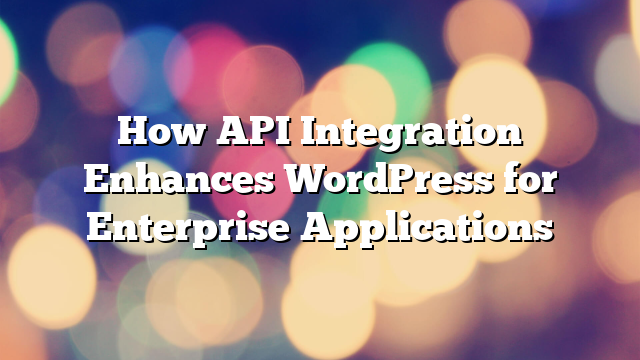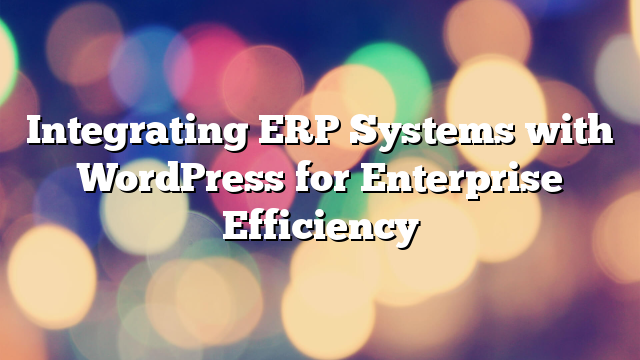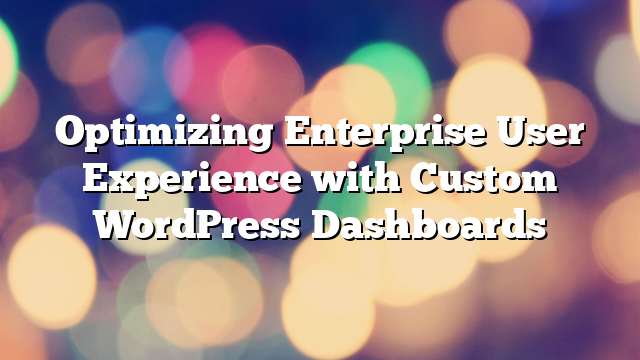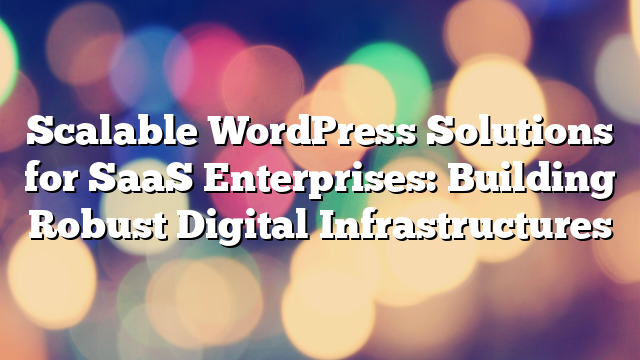How API Integration Enhances WordPress for Enterprise Applications
28.10.2024

WordPress has evolved far beyond its origins as a simple blogging platform. Today, it’s a powerful content management system (CMS) capable of supporting enterprise-level websites and applications. One of the key factors driving WordPress’s versatility and scalability for large organizations is its ability to integrate with third-party applications and services through APIs (Application Programming Interfaces). By leveraging API integration, enterprises can enhance WordPress’s functionality, improve workflow automation, and create seamless user experiences across multiple platforms. In this article, we’ll explore how API integration can elevate WordPress for enterprise applications.
What Is API Integration?
An API is a set of rules that allow one piece of software to interact with another. APIs enable data sharing, communication, and interaction between applications in a standardized way. In the context of WordPress, API integration involves connecting your WordPress website with external systems—such as CRM platforms, e-commerce systems, marketing tools, and custom applications—through the use of APIs.
This integration allows enterprises to extend WordPress’s native functionality, automate processes, and ensure seamless interactions between WordPress and other critical business systems.
Key Benefits of API Integration for Enterprises
1. Centralized Data Management
Enterprises often rely on various tools and platforms to manage their operations, from customer relationship management (CRM) systems to inventory management, analytics, and more. API integration allows these systems to communicate with WordPress, enabling centralized data management.
For example, integrating a CRM like Salesforce or HubSpot with WordPress enables the seamless flow of customer data between the website and CRM platform. Customer interactions on the website, such as form submissions or purchases, can be automatically synced with the CRM, ensuring that your sales and marketing teams have up-to-date information on customer behavior.
This centralized data approach reduces manual data entry, improves accuracy, and enhances the ability to analyze and act on real-time data insights.
2. Enhanced E-Commerce Functionality
Many enterprises use WordPress for e-commerce, particularly when combined with the WooCommerce plugin. API integration can significantly enhance e-commerce functionality by connecting WordPress to external payment gateways, inventory management systems, shipping providers, and fulfillment services.
For example, integrating WooCommerce with a payment processor like Stripe or PayPal via API allows businesses to securely process transactions. Additionally, syncing WooCommerce with inventory management software ensures that stock levels are automatically updated in real-time, preventing overselling and ensuring a smooth customer experience.
API integrations also enable more sophisticated e-commerce solutions, such as dynamic pricing, personalized recommendations, and cross-channel order management, helping enterprises scale their online stores more efficiently.
3. Seamless Marketing Automation
API integration enables enterprises to connect WordPress with marketing automation platforms like Mailchimp, Marketo, or ActiveCampaign. This connection allows businesses to automate key marketing tasks, such as email campaigns, lead nurturing, and personalized content delivery based on user behavior.
For example, integrating Mailchimp with WordPress can automatically sync user data from your site, such as new email signups, into your mailing lists. This automation ensures that your email marketing efforts remain up-to-date without requiring manual data entry. Additionally, API integration can trigger automated email campaigns based on user interactions, such as sending a follow-up email after a user abandons their shopping cart.
By streamlining marketing workflows, API integration helps enterprises improve engagement, boost conversion rates, and deliver more personalized user experiences.
4. Custom Application Development
Enterprises often require custom applications to meet specific business needs, whether for internal tools, customer portals, or specialized services. Through API integration, custom applications can be developed to work seamlessly with WordPress.
For instance, an enterprise might need a customer portal that integrates with WordPress to provide personalized access to data or services. By leveraging APIs, the portal can pull data from multiple sources (such as a CRM or billing system) and display it to users within a WordPress-powered interface.
This flexibility allows enterprises to tailor WordPress to meet the exact needs of their business, while still benefiting from WordPress’s robust content management features.
5. Improved User Experience with Headless WordPress
Many enterprises are moving towards headless WordPress, where the front-end is decoupled from the WordPress CMS and handled by a modern JavaScript framework like React or Next.js. In a headless architecture, API integration plays a critical role in delivering content and functionality to the front-end, creating faster, more dynamic user experiences.
By using WordPress’s REST API or GraphQL, enterprises can pull content from WordPress and deliver it to a variety of platforms, such as websites, mobile apps, or even IoT devices. This approach is particularly useful for organizations that need to deliver content across multiple channels while maintaining a consistent and optimized user experience.
Common API Integration Use Cases for Enterprises
1. CRM Integration
Integrating WordPress with a CRM system allows enterprises to manage customer data more efficiently. With API integration, customer interactions on your website—such as form submissions, purchases, or content downloads—can be automatically synced with the CRM. This integration ensures that your sales, marketing, and customer service teams have real-time access to customer data, improving the ability to personalize interactions and manage customer relationships.
2. Payment Gateway Integration
Enterprises that process online payments can use API integration to connect WordPress with external payment gateways like Stripe, PayPal, or Square. This connection allows for secure, seamless payment processing directly on your website, while also automating transaction data syncing with accounting or financial systems.
3. Marketing Platform Integration
Integrating WordPress with marketing platforms like Mailchimp or HubSpot allows businesses to automate email marketing, lead generation, and campaign management. API integration ensures that customer data from WordPress is automatically synced with your marketing tools, enabling more targeted and effective marketing efforts.
4. Inventory Management Integration
E-commerce enterprises can benefit from integrating WordPress with inventory management systems. API integration ensures that product stock levels are automatically updated in real-time, preventing overselling and ensuring that inventory data is consistent across all channels. This is particularly useful for businesses that manage multiple sales channels, such as physical stores and online marketplaces.
5. Social Media Integration
API integration can connect WordPress with social media platforms like Facebook, Twitter, and Instagram, allowing enterprises to automate the sharing of content across these channels. This integration ensures that content is consistently posted to social platforms without requiring manual updates, saving time and ensuring brand consistency.
Conclusion
API integration is a powerful tool for enhancing WordPress’s functionality, particularly for enterprises with complex needs. By connecting WordPress to external systems such as CRMs, e-commerce platforms, marketing automation tools, and custom applications, enterprises can create a more efficient, scalable, and user-friendly digital infrastructure.
Whether you’re looking to improve data management, automate workflows, or develop custom applications, API integration opens up a world of possibilities for WordPress. If you’re considering implementing API integrations for your enterprise website, contact AllWebDev for expert advice and support in optimizing your WordPress setup.



